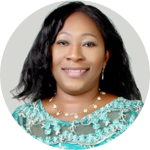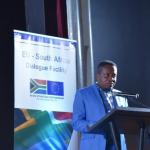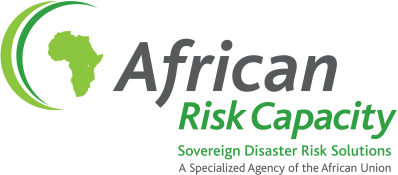The overall objective of this training programme is to enhance the technical capacity of stakeholders to consider gender in sustainable development actions. The programme aims to strengthen the capacities of professionals to analyse the impacts of climate change and lead advocacy initiatives on behalf of vulnerable populations. Partnership building and networking across the Global South will be central to the training.
The programme is implemented in collaboration with Alfajiri WHeT and the African Risk Capacity - ARC, which is mandated to assist African Union member states in better planning, preparing, and responding to climate-related disasters.
Objectives
- Acquire skills to analyse and use innovative tools to help overcome gender inequalities in the face of climate risks
- Analyse the impacts of gender inequality on climate change and disaster risk management
- Develop practical tools to implement programmes and projects to mitigate climate change and manage risks from a gender mainstreaming perspective as part of your professional, academic, or associative activities
- Exchange experiences with other professionals confronted with climate change and disaster risk management challenges
- Join an international network of gender and disaster risk management (DRM) and climate change (CC) advocates
Who should apply?
- Government functionaries who hold or are expected to take on roles of responsibility for the implementation of DRM & CC policies and strategies
- Private sector actors involved in DRM initiatives
- Youths desirous of taking up career
opportunities in DRM and CC - Advocates for gender-responsive approaches in DRM and CC actions and initiatives
- Representatives of civil society organisations active at the national and international levels
- Representatives of Regional bodies and international organisations
Target audience
This program is designed for professionals from English-speaking African countries, particularly member states of the African Union, as well as professionals from other English-speaking countries worldwide, who are engaged in or interested in gender, climate change and risk management.
Related SDGs


The design of the programme will be carried out by a teaching staff selected by the Institute. The Institute will forge partnerships with other organisations to facilitate the design and implementation of the programme.
The programme will organise groups of a maximum of 15 participants. In this regard, the total teaching time required should be multiplied according to the number of groups formed.
Module 1
Gender concepts, theories and tools
- Acquire methodological, theoretical and operational tools for integrating a gender perspective into professional fields
- Analyse how gender inequalities are (re)produced in different geographical contexts
Module 2
Gender and climate change adaptation and mitigation
- Acquire knowledge of international DRM and CC frameworks, policies and strategies
- Share insights and tools to address DRM and CC: the case of the ARC mechanism
- Deepen understanding of gender roles in adaptation and women’s decision-making in affected regions
- Support climate justice and women’s participation in line with SDGs and the Paris Agreement
Module 3
Gender and Disaster Risk Management in fragile climatic contexts
- Incorporate a gender perspective into climate change and disaster risk management
- Explore the link between gender, Disaster Risk Management and governance
- Integrate a gender perspective into all the phases and components of a project’s life cycle
Module 4
Gender, health and prevention of gender-based violence in climate emergencies
- Explore how macroeconomic policies impact gender in health, with a focus on feminist perspectives
- Understand the role of gender in global health policies, especially in development and humanitarian aid
- Analyse the socio-economic impact of gender-based violence in humanitarian crises in relation to patriarchal norms
- Explore the potential of women networks in advocating for gender responsiveness in DRM and CC patriarchal norms
The training is conducted in English and is primarily delivered remotely (online). During each week of the module, participants are required to actively engage in the online forums and attend webinars (exact times and dates will be communicated later).
The programme includes two workshops: one during Module 1 and another during Module 4. The first will be held in a virtual format, while the second may be delivered either virtually or in person in Geneva. If a minimum of 15 students interested in attending the in-person workshop is not reached, the Institute reserves the right to cancel it and proceed with the online format only. Students will be responsible for their own travel and accommodation costs for the in-person workshop.
Module 1
Four weeks online from 5 November to 2 December 2025
Four-day online workshop between 10 and 22 December 2025
Module 2
Three weeks online from 7 to 27 January 2026 and two webinars
Module 3
Three weeks online from 4 to 24 February 2026 and two webinars
Module 4
Four weeks online from 4 to 31 Mars 2026
Four-day workshop, either online or face-to-face in Geneva, between 8 to 21 April 2026
Applied research
Four weeks online with individual support, from 29 April to 26 May 2026
The personal research paper must be submitted by 30 June 2026
Executive Certificate in Gender and Risk Management in Climate Change
Certificate of Advanced Studies
15 ECTS
- Full fee: CHF 8,900
- a 10% discount will be offered to alumni of IHEID's Executive Education
- Payment deadline: 15 September 2025
Travel and accommodation expenses to Geneva, as well as insurance (travel/health), will be the responsibility of participants.
Tuition must be paid before the start of the training.
Payment instructions will be provided to admitted participants upon acceptance.
The requirements to participate in the Executive Certificate are as follows:
- A university degree (undergraduate, bachelor's, or equivalent);
- Proficiency in English;
- Access to high-speed internet.
Application period opens: April 2025
Application deadline: 31 August 2025
To submit your application, you must provide the following online:
- Application form
- Scanned copy of academic degrees
The Selection Committee will review all submitted applications and respond to each candidate no later than 5 September 2025.
Accepted applicants will receive an admission letter along with the invoice for tuition payment. After payment, final registration must be completed with the Executive Education Department at IHEID.
For any questions related to payment, financial assistance, changes in programmes, prices, and conditions of withdrawal, please visit our Terms & Conditions page.
AFRICAN RISK CAPACITY
ARC Agency was established in 2012 as a Specialized Agency of the African Union, and ARC Limited, the commercial affiliate of the Group, was established in 2014.
The mandate of ARC is to work with AU member states to help them better plan, prepare and respond to weather-induced threats and disease outbreaks. Its value proposition combines four critical elements of disaster response: capacity building, early warning, risk pooling, and risk transfer.
Since 2019, ARC has been mainstreaming gender in DRM as part of the ARC programme. The approach first seeks to understand the status of gender in a country through a gender analysis, then proposes a gender action plan to address the findings. ARC is committed to working with African countries to support response, regardless of the challenges in the operating landscape.
ALFAJIRI WHET
Alfajiri We Heal Together
Alfajiri WHeT is an organization established in Burundi, whose members have over 12 years of experience working with Swiss Agency for Development and Cooperation (SDC). Alfajiri is a social enterprise of committed professionals, offering expertise and quality support to institutions and communities in the Great Lakes region, ensuring the positive transformation of social norms for gender equality, better health, and sustainable development.
Alfajiri WHeT bases its intervention on research and project and program evaluations, institutional development, and organizational and financial strengthening of national or international organizations, training in gender and PSEAH (Prevention of Sexual Exploitation, Abuse, and Harassment), the development of transformative community approaches to gender social norms, advocacy, and communication on gender, PSEAH, and sexual and reproductive rights issues.
Upcoming events
Subscribe to our newsletter
By completing this form, you agree that the Institute may store and use your e-mail address to send you the newsletters you have chosen. To learn more.












